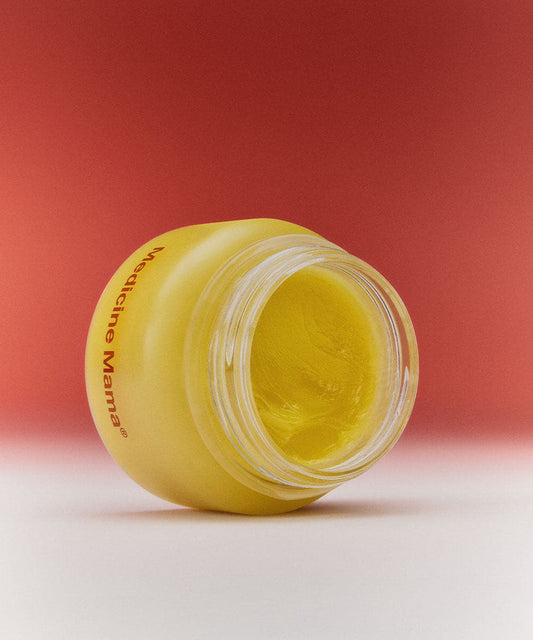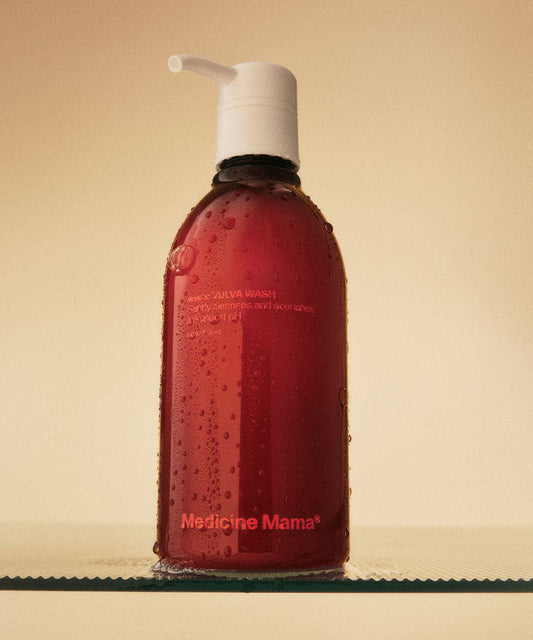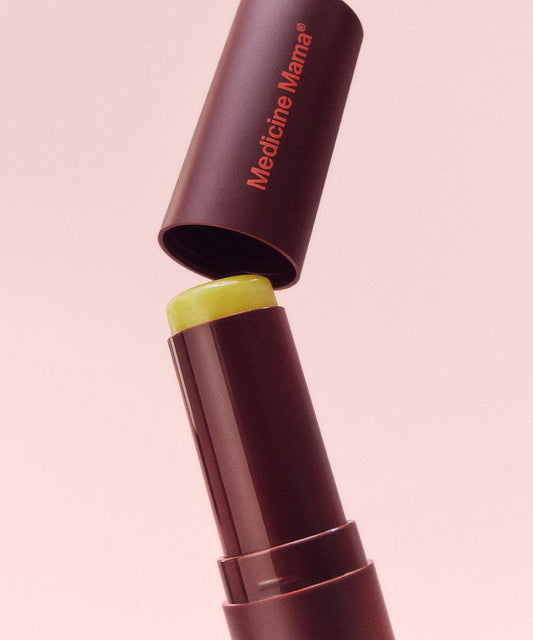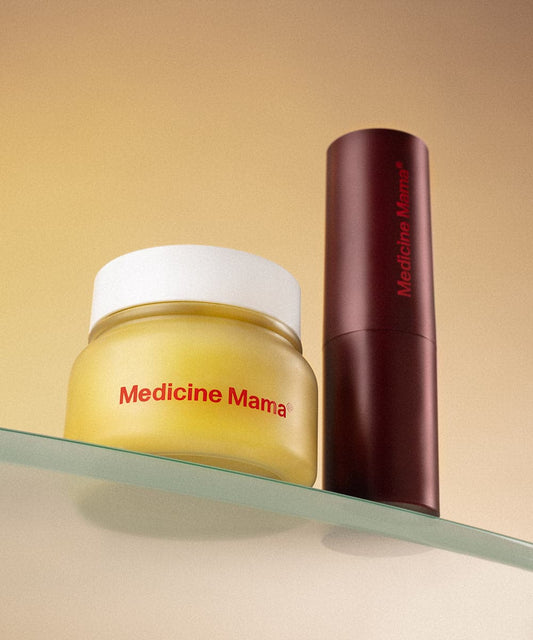Reviewed by | Dr. Clare Bertucio MD
Dealing with a vulva boil can be an uncomfortable and sometimes embarrassing experience, but it's more common than you might think. At Medicine Mama, we believe in breaking the silence around intimate health issues and providing you with the knowledge and tools to manage them effectively.
This article will guide you through understanding vulva boils, their causes, and the best homecare practices to alleviate discomfort and support healing. By approaching this topic with openness and proactive care, you can take control of your health and feel empowered to address any issues that arise.
What Are Vulva Boils?
A vulva boil, medically known as a furuncle, is a painful, pus-filled bump that forms under the skin due to a bacterial infection, typically involving hair follicles. These boils often start as red, tender areas that become firm and increasingly painful. Eventually, the boil may rupture and drain, which can provide relief.
Common causes of vulva boils include bacterial infections, particularly with Staphylococcus aureus. Ingrown hairs, which happen when a hair grows back into the skin instead of rising up from it, can also lead to boils. Other contributing factors include friction from tight clothing, poor hygiene, weakened immune system, and conditions like diabetes.
Symptoms of a vulva boil can vary but usually include a painful, swollen bump on the vulva that may grow over several days. The area around the boil can become red, swollen, and warm to the touch.
As the boil worsens, a yellow or white center filled with pus may develop. In some cases, boils can be accompanied by fever or swollen lymph nodes, which would indicate a more severe infection that requires medical attention.
What Homecare Steps Can You Take if You Have a Vulva Boil?
Dealing with a vulva boil can be both physically and emotionally taxing. That said, taking prompt action with proper homecare steps can significantly ease your discomfort and help speed up the healing process.
Here are some immediate steps you can take:
Warm Compresses
One of the most effective initial treatments for a vulva boil is applying warm compresses. Use a clean, soft cloth soaked in warm (not hot) water and gently press it against the affected area for about 10 to 15 minutes.
Repeat this process three to four times a day. The warmth helps increase blood circulation to the area, promoting the boil to come to a head and eventually drain naturally.
Maintain Good Hygiene
Keeping the vulvar area clean is crucial to support healing. Wash gently with warm water and a mild, unscented soap like our VMAGIC® Vulva Wash.
Avoid scrubbing the area as it can irritate the boil and surrounding skin. After washing, pat the area dry with a clean towel. Always make sure that your hands are clean before touching the affected area to prevent introducing new bacteria.
Avoid Squeezing the Boil
As tempting as it might be, never try to squeeze or pop a vulva boil. This can push the infection deeper into the ski, makinge the situation worse and potentiallyspreadingd the infection. Letting the boil rupture naturally is much safer and less painful in the long run.
Wear Loose, Breathable Clothing
Wear loose-fitting, breathable fabrics such as cotton underwear and avoid tight clothing that can cause friction and irritation. Allowing the area to breathe reduces moisture buildup and helps keep the skin dry, which is essential for healing.
Keep the Area Dry
Moisture can exacerbate the infection and discomfort. After cleaning the area or applying warm compresses, ensure that the vulva is completely dry.
If needed, you can use a clean, dry cloth to gently pat the area. Avoid using talcum powder or other drying agents because these can cause further irritation.
Use Over-the-Counter Pain Relief
If the pain is significant, over-the-counter pain relievers like ibuprofen or acetaminophen can help reduce discomfort and inflammation. Always follow the recommended dosage instructions on the packaging and consult with your healthcare provider if you have any concerns or underlying health conditions.
Topical Antibiotics
Applying a topical antibiotic ointment to the area can help fight the infection. Look for products containing ingredients like bacitracin or neomycin. Apply a small amount to the boil after cleaning the area, and cover it with a clean bandage if needed to prevent contamination from clothing.
Monitor for Signs of Complications
While most vulva boils can be managed at home, it’s important to keep an eye out for signs of complications. If you experience severe pain, fever, or increasing redness, or if the boil does not improve within a few days, it may be wise to give your doctor a call. These could be signs of a more serious infection that requires professional treatment.
How Can You Promote Proper Healing of a Vulva Boil?
After addressing the immediate discomfort of a vulva boil, the next crucial step is to promote healing and ensure the infection clears up completely. If you take a few simple steps, you can support your body’s natural healing processes and prevent the recurrence of boils.
Continue Warm Compresses
Even after the boil has started to drain, continue applying warm compresses. This helps to keep the area clean and encourages the remaining infection to surface and drain fully.
Stick to a routine of three to four times a day, ensuring each session lasts around 10 to 15 minutes. The ongoing warmth not only soothes pain but also aids in complete drainage.
Use Healing Ointments
Applying healing ointments can significantly speed up the recovery process. Once the boil has drained, you can use antibiotic ointments to prevent further infection.
Products containing natural healing ingredients like honey and propolis can also be beneficial. Our VMAGIC® Vulva Balm is a great option because it provides nourishment and protection with its soothing properties. Apply a small amount to the affected area after each wash and warm compress.
Maintain Proper Hygiene
Remember, continued hygiene is essential to promote healing. Gently wash the area with warm water and a mild, unscented cleanser.
As much as possible, make sure the vulva is kept clean and dry, and avoid any harsh soaps or fragrances that could irritate the skin. Pat the area dry with a clean towel after each wash, and change your underwear regularly to keep the area free from bacteria.
Boost Your Immune System
A strong immune system plays a vital role in healing and preventing future boils. Focus on a balanced diet rich in vitamins and minerals, particularly those known for boosting immunity, such as vitamin C, vitamin E, and zinc. Staying hydrated and getting enough rest are also critical components of maintaining a robust immune system.
Avoid Irritants
During the healing process, it’s essential to avoid anything that could irritate the vulva. This includes avoiding scented products, harsh laundry detergents, and tight clothing. Stick to breathable cotton fabrics and hypoallergenic products to minimize irritation and support a healthy healing environment.
Practice Safe Hair Removal
If you remove hair in the vulvar area, it’s crucial to do so safely to avoid further irritation. Opt for gentle methods like trimming or using an electric razor designed for sensitive skin. If you prefer shaving, always use a clean, sharp razor and shave in the direction of hair growth to reduce the risk of cuts and ingrown hairs, which can lead to more boils.
Stay Active, But Gentle
While strenuous activities might be off-limits during the healing period, light exercise can be beneficial. Gentle activities like walking can improve circulation, aiding in the healing process. Just ensure any exercise wear is loose and breathable to prevent friction and moisture buildup.
Keep Stress Levels in Check
Chronic stress can weaken your immune system, making it harder for your body to heal. Engage in stress-reducing activities such as yoga, meditation, or even simple deep-breathing exercises. Prioritizing self-care and relaxation can make a significant difference in your overall well-being and recovery speed.
When Should You See a Doctor About a Vulva Boil?
While home care can be highly effective, there are times when professional medical advice is essential. If you notice that the boil is not improving after a week of home treatment or becomes increasingly painful, red, or swollen, it's time to consult a healthcare provider.
Also, if you experience fever, chills, or the boil recurs frequently, these could be signs of a more serious infection requiring medical intervention. Always prioritize your health and seek professional guidance when in doubt.
Wrapping Up
Dealing with a vulva boil can be uncomfortable, but with the right homecare steps and an understanding of when to seek medical help, you can manage and heal this condition effectively. Remember to maintain good hygiene, use soothing and protective products, and support your immune system to prevent recurrence.
Empowering yourself with knowledge and proper care will help you stay comfortable and healthy. At Medicine Mama, we’re here to support you every step of the way on your journey to wellness.
Sources:
Staph infections | Mayo Clinic
Bacitracin Topical - StatPearls | NCBI Bookshelf
Zinc in Human Health: Effect of Zinc on Immune Cells | NIH
Effects of stress on immune function: the good, the bad, and the beautiful | NIH



